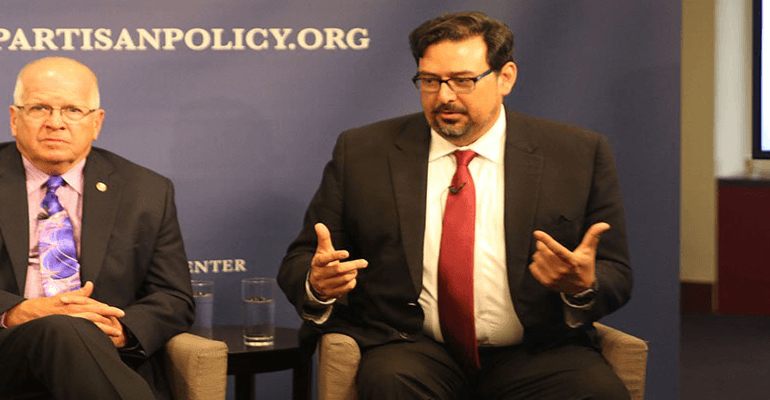
WASHINGTON – Maricopa County Recorder Adrian Fontes said Friday that a new “master database of voters” should help Arizona and other states improve the accuracy of voter rolls and increase access to voter registration.
Fontes was in Washington as part of a four-person panel of officials from around the country talking about ERIC – the Electronic Registration Information Center – that combines multiple federal and state databases, including the Social Security death index, voting and driving records.
The organization gives local election officials more information on the voters in their area than ever before – including finding eligible voters who may not have registered yet.
The state now knows “whether a voter moved, because it’s tied into the Postal Service, whether a voter has died, because it’s tied into the Social Security master death-list and other state vital records, whether a voter has registered someplace else,” Fontes said.
“It’s a way for us to have sort of a master database of the voters who are registered in member states,” he said after the program at the Bipartisan Policy Center.
In December, Arizona joined 21 other states and Washington, D.C., in ERIC, which has since added Missouri. Florida is expected to join soon, after its legislature approved the move, and Michigan lawmakers are currently debating it.
During the panel Fontes pointed to integrity, transparency and security of the election process as the three critical factors to consider when Arizona uses ERIC.
“When we came on board, our administration was really focused on engaging the voters and helping them by clearing up some of the questions, increasing, integrity, transparency and security,” Fontes said. “And ERIC does all of those things.”
Fontes was joined on the panel by Michigan state Sen. Judy Emmons, New Mexico Secretary of State Maggie Oliver, Missouri Secretary of State Jay Ashcroft and Hillsborough County, Florida, Supervisor of Elections Craig Latimer.
Arizona has yet to take advantage of ERIC – Fontes said the first mailing to “eligible-but-unregistered voters” could come this summer – but other panelists have already seen benefits from the program.
New Mexico joined ERIC in time for the 2016 election and saw immediate increases in voter registration, Oliver said during the panel.
“We sent out the first eligible-but-unregistered mailing prior to 2016,” Oliver said. “Bernalillo County, which has approximately 400,000, 450,000 registered voters at any given time … added 80,000 registered voters to the rolls in the two weeks between when the voter registration deadline closed and when early voting started.”
ERIC also helped New Mexico clean up the state’s voting rolls.
“Just on our first round of list maintenance, we identified about 7,500 voters who moved out of the state and we removed them from the rolls,” Oliver said. “And we identified 2,500 voters who were deceased that we were not aware of.”
Ashcroft said joining ERIC is a way for Missouri to reduce the number of clerical errors and make the election process smoother.
“There are so many things with elections we can’t control,” he said at the discussion. “We can control making sure that data is good … and that is such a central place that we can make an impact and difference on the voting experience.”
Fontes agrees that improving the voter experience and increasing voter registration is the most important aspect of ERIC.
“Where we’re at is looking at the voter’s experience first,? Fontes said during the panel. “From the voter’s experience, what do they expect or demand from us?”
By listening to voters and using the large amount of data ERIC provides access to, Fontes said Arizona could increase future voter participation.
“We’re doing the voter experience thing, by listening to our voters and following that data,” he said. And by using the data could make it easier for voters “to fulfill that basic fundamental right and vote.”
